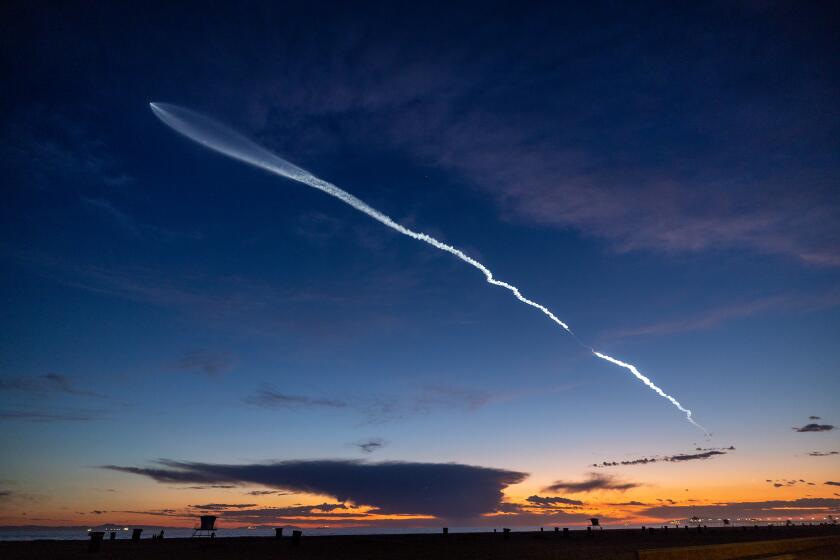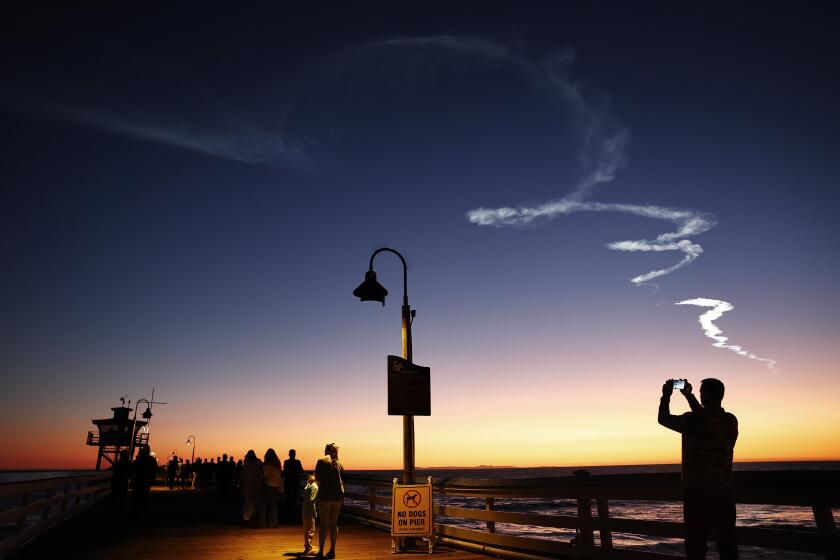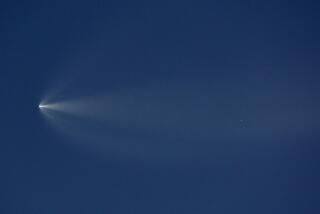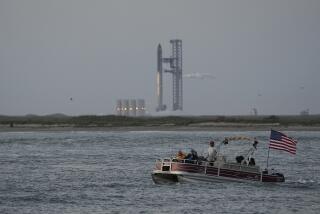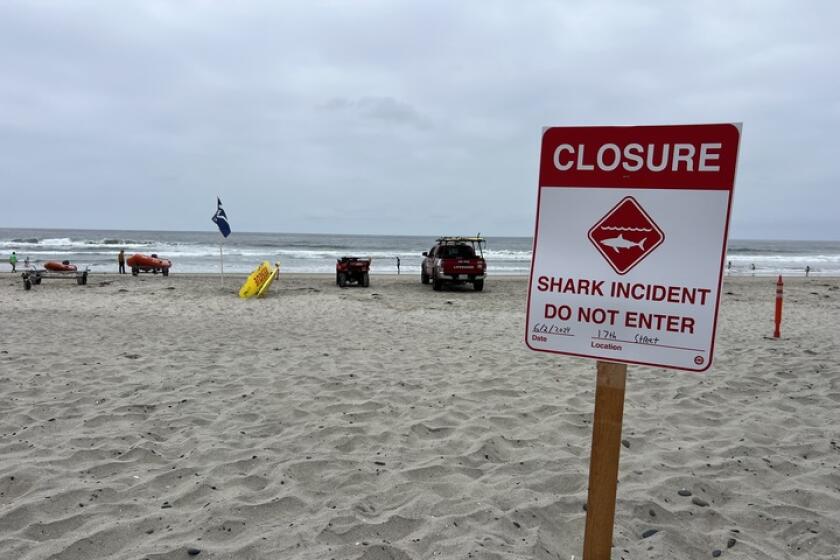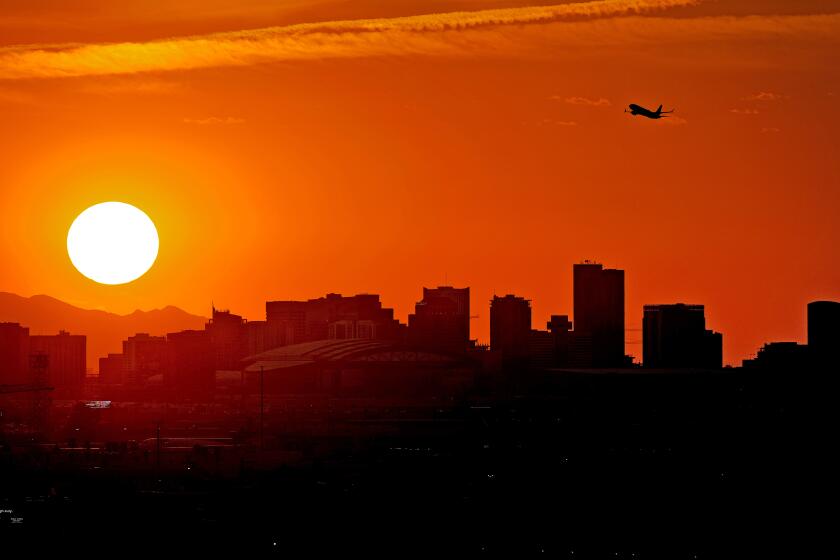SpaceX plans to launch 90 rockets from Vandenberg Space Force Base by 2026. Could that harm the coast?

SpaceX plans to launch 90 rockets into space from a Santa Barbara County military base by 2026, tripling the number of blasts rocking the coastal community — and raising concerns from neighbors and environmental groups about the effects on marine life.
Founded by billionaire Elon Musk, SpaceX has ramped up the number of rocket launches from Vandenberg Space Force Base in recent years, and it has made clear its desire to increase the frequency of blastoffs. But during a California Coastal Commission hearing Friday, U.S. Space Force officials outlined for the first time its own plans to multiply the number of launches from the base, from 37 in 2023 to more than 120 a year by 2026.
The overwhelming majority of those rocket liftoffs would be conducted by SpaceX, which has already done more launches from the base than the commission has approved.
Last year SpaceX breached an agreement with the commission that limited the number of launches to six, sending 28 rockets into space.
It is seeking an agreement with the commission to do 36 launches a year, increasing to 90 in 2026.
The decision by the commission, which was created to protect the state’s coastal resources, will directly affect residents and marine life near the military base that hear and feel the rockets’ sonic booms.
It could also redirect the future of SpaceX, whose pursuit to redefine space exploration is already closely tied with U.S. military interests, given its work as a military contractor.
“The ultimate goal is for this to be more routine and not a huge deal,” said Space Force Col. Bryan Titus, operations vice commander at the base.
The U.S. Space Force said it wants to launch 36 rockets a year from Vandenberg Space Force Base. The Coastal Commission has concerns.
Formed in 2019, the U.S. Space Force has been looking to improve its ability to send rockets into space, Titus said, so SpaceX’s ability to launch with more frequency is a benefit to the U.S. military.
SpaceX launched 96 rockets in 2023 from Vandenberg and three other facilities: Cape Canaveral Space Force Station in Florida, NASA’s Kennedy Space Center in Merritt Island, Fla., and SpaceX Starbase in Boca Chica, Texas.
Environmental groups argue that turning launches into a routine event could affect marine life.
“We’re concerned that more frequent launches will result in permanent changes,” said Ana Citrin, legal and policy director for the Gaviota Coast Conservancy.
Federal agencies, including the U.S. Fish and Wildlife Service and National Marine Fisheries Service, monitor the effects of the liftoffs on such animals as sea otters, bats, western snowy plovers, California least terns and California red-legged frogs.
Thus far, the monitoring has shown that some of the animals might react to the blastoff by flushing, or fleeing from their nests and homes, but they return soon after, according to U.S. Space Force officials. No long-term effects have been seen, they said.
SpaceX did not respond to a request for comment.
After years of delay that have put it behind SpaceX, Boeing is set to launch its new Starliner capsule with two crew members to the International Space Station.
Flushing or hunkering down after a blast are already signs of wildlife exhibiting signs of stress, said Duncan Leitch, a professor of integrative biology at UCLA.
Most animals can adapt to infrequent incidents, but exposure to more frequent stressful incidents can change their biology as well as their behavior, he said.
In the worst-case scenarios, he said, the ability of birds to communicate could be impeded, and migratory birds could avoid the area. Fish and other animals that use sound to communicate and navigate underwater — including whales — could be affected too.
“Over a longer period of time, there may be reductions in the population of fish as they move away from the sound, or they may be affected to the point that it affects their health,” Leitch said. “It would change the ecosystem as far as other animals that rely on the fish.
“Having sounds that are well into the damaging, or painful, range of decibels now occurring [100] times a year, the animals might not have the ability to change their behavior or accommodate these types of sounds.”
Some environmental groups, including the Surfrider Foundation, are asking the commission to reject the increase.
Early risers on California’s Central Coast and parts south were treated to a SpaceX rocket launch.
SpaceX “intends to begin increasing very rapidly, so we’re very concerned about this,” said Mandy Sackett, senior California policy coordinator for the Surfrider Foundation.
More frequent launches could change the way wildlife in the area responds in the long term, environmental groups said.
Members of the California Coastal Commission are also asking whether SpaceX should be entitled to circumvent the permit process, as federal agencies are.
Federal entities negotiate agreements with the commission but ultimately can move ahead even without commission approval. In such cases, the commission’s recourse would be through mediation or the courts.
Because SpaceX is a U.S. Space Force contractor, military officials argue that all launch operations at the base by the company are “federal activities.”
But U.S. Space Force officials said only 25% of the rockets launched into space by SpaceX are carrying payloads for the Department of the Defense.
The vast majority of the liftoffs are for the company’s private benefit, raising questions about why SpaceX can dispense with permits when 75% of its blasts from the base don’t involve the U.S. government.
“That is still pretty skewed for me,” Commissioner Mike Wilson said during a meeting Friday.
Some commissioners — whose focus is usually on environmental protection, development and water issues during their monthly meetings — also brought up the war in Ukraine during Friday’s discussion.
“I question the national security public benefit of concentrating that much power, literally communication power, in one company that we’re enabling in this case,” Wilson said. “[SpaceX] has already showed that it will play in international conflicts at the will of one human being.”
Earthlings from Southern California to Phoenix were treated to a spectacular, albeit brief, show as night fell and the light illuminated the sky.
Wilson was referring to reports that Musk’s company refused to allow Ukraine to use satellite internet service from Starlink, a subsidiary of SpaceX, to help it carry out an attack against Russia in September 2022.
“If the idea is that we’re supporting these permits on the side that we’re promoting national defense, and then a single company is able to dismantle our allies during armed conflict — that really doesn’t align,” Commissioner Justin Cummings said.
“I suspect that would violate our strategies around national defense.”
Titus declined to address the question, saying it was “out of my lane,” but he said he would try to get answers to address the commissioners’ concerns.
Some commissioners on Friday also argued that SpaceX, not U.S. military officials, should be making the company’s case in front of the agency.
“When this comes back, I think it would be really important that a representative from SpaceX comes to the meeting,” Cummings said.
Cummings said it was “ridiculous” for SpaceX not to appear at the meeting, despite multiple efforts from the agency to have SpaceX officials speak.
“They obviously refuse to because they’ve never shown up,” he said.
On Friday, Commission Chair Caryl Hart suggested an agreement might not be possible unless SpaceX changes its stance.
“From my perspective,” Hart said, “I think we’re going to continue to hit significant obstacles in achieving a federal consistency ruling without having SpaceX.”
More to Read
More to Read
More to Read
Start your day right
Sign up for Essential California for news, features and recommendations from the L.A. Times and beyond in your inbox six days a week.
You may occasionally receive promotional content from the Los Angeles Times.
